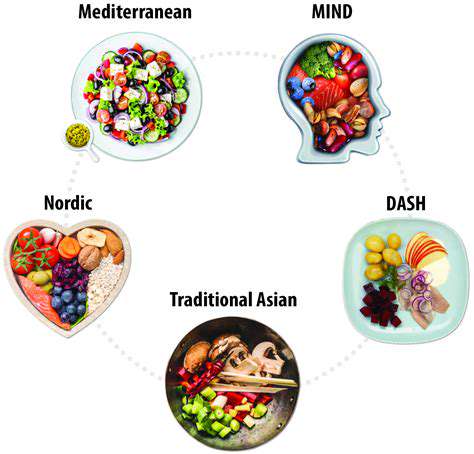The Science of Eating for Longevity
Caloric restriction, the practice of consuming fewer calories than your body expends, has garnered significant attention in recent years for its potential health benefits. While often associated with weight loss, the science behind caloric restriction extends far beyond simply shedding pounds. Researchers are exploring its impact on cellular processes, aging, and various chronic diseases. Understanding the intricacies of this dietary approach is crucial for anyone seeking a healthier lifestyle.
Cellular Repair and Regeneration
Caloric restriction has been linked to increased cellular repair and regeneration. Studies suggest that by reducing calorie intake, the body shifts its focus from growth and reproduction to maintenance and repair. This can lead to a healthier cellular environment, potentially slowing down the aging process and mitigating age-related decline. This process, while fascinating, requires further study to fully understand its mechanisms and implications.
Impact on Chronic Diseases
One of the most promising aspects of caloric restriction is its potential to combat chronic diseases. Research indicates that it might help lower blood pressure, improve insulin sensitivity, and reduce inflammation – all factors that contribute to conditions like type 2 diabetes, heart disease, and certain cancers. However, more robust clinical trials are needed to confirm these potential benefits and establish definitive connections.
The Role of Autophagy
Autophagy, a cellular process that removes damaged or unnecessary components, plays a crucial role in the positive effects of caloric restriction. Studies have shown that caloric restriction can significantly increase autophagy activity. This process helps clear out cellular waste, potentially preventing the accumulation of harmful substances and maintaining cellular health. This is a fascinating area of research with implications for longevity and disease prevention.
Potential Benefits for Longevity
Caloric restriction has been a subject of investigation for its potential to extend lifespan. While the exact mechanisms are still being explored, research suggests that by reducing cellular stress and increasing cellular repair, it may contribute to a healthier aging process. A longer lifespan, however, is a complex issue, and caloric restriction is only one piece of the puzzle in the quest for longevity.
Practical Considerations and Limitations
Implementing caloric restriction requires careful consideration and planning. Sudden and drastic reductions in calorie intake can have negative consequences, such as nutrient deficiencies and decreased metabolic rate. It's crucial to work with a healthcare professional or registered dietitian to develop a safe and personalized plan. The effectiveness of caloric restriction can vary significantly from person to person.
Ethical Considerations and Future Research
While caloric restriction shows promise, there are ethical considerations to address. Long-term studies with diverse populations are needed to fully understand the potential benefits and risks. Further research should focus on identifying optimal caloric restriction strategies for different individuals and contexts. The long-term effects of caloric restriction on the human body are still not fully understood, and more research is necessary for safe and effective implementation.
The Role of Antioxidants and Anti-inflammatory Foods
Antioxidants: Neutralizing Cellular Damage
Antioxidants are compounds that protect your cells from damage caused by unstable molecules called free radicals. Free radicals are byproducts of normal metabolic processes, but they can also be generated by environmental factors like pollution and UV radiation. This damage, if left unchecked, can contribute to aging and various diseases. Antioxidants essentially neutralize these free radicals, preventing them from wreaking havoc on healthy cells and tissues. A diet rich in antioxidants is crucial for maintaining cellular health and potentially extending lifespan.
Many fruits and vegetables are excellent sources of antioxidants, including vitamins C and E, and various phytonutrients. These compounds work synergistically to bolster your body's natural defense mechanisms against oxidative stress. Understanding the role of antioxidants is key to appreciating how a balanced diet can support cellular health and contribute to overall well-being.
Anti-inflammatory Foods: Reducing Systemic Inflammation
Chronic inflammation is linked to a wide range of health problems, including heart disease, type 2 diabetes, and certain cancers. Anti-inflammatory foods can help mitigate this inflammatory response, reducing the risk of these conditions. These foods often contain compounds that regulate the body's inflammatory pathways, thereby promoting a more balanced and healthy internal environment.
Foods rich in omega-3 fatty acids, like fatty fish and flaxseeds, are known for their anti-inflammatory properties. Furthermore, foods rich in antioxidants, such as berries and leafy greens, also contribute to reducing inflammation. Incorporating these foods into your diet can be a proactive step towards managing inflammation and potentially improving overall health.
The Synergistic Effect of Combined Consumption
The benefits of antioxidants and anti-inflammatory foods are often amplified when consumed together. A diet rich in both types of foods creates a powerful protective effect, supporting cellular health and mitigating inflammation. This synergistic effect highlights the importance of a balanced diet that encompasses a variety of nutrient-rich foods rather than focusing solely on individual components.
For instance, colourful vegetables contain both powerful antioxidants and compounds that help regulate inflammation. This combination of nutrients works together to create a positive effect on cellular health. This holistic approach to nutrition is crucial for long-term health and well-being.
Beyond Individual Foods: Dietary Patterns for Longevity
While specific foods offer significant anti-inflammatory and antioxidant benefits, the overall dietary pattern plays a critical role in promoting longevity. A balanced diet rich in fruits, vegetables, whole grains, and lean proteins, alongside adequate hydration, is essential for optimal health. Adopting a Mediterranean-style diet, characterized by abundant plant-based foods, is often cited for its potential health benefits, including a reduced risk of chronic diseases and potentially a longer lifespan.
Beyond the food itself, factors like portion control, regular meal times, and mindful eating habits all contribute to the overall effectiveness of a diet rich in antioxidants and anti-inflammatory foods. A holistic approach to nutrition is more impactful than focusing solely on individual food components.
Beyond Specific Foods: The Importance of Dietary Patterns

Beyond the Nutritional Value: The Importance of Dietary Habits
Understanding the nutritional value of specific foods is crucial, but it's equally important to recognize the significance of overall dietary habits. These habits form the foundation for long-term health and well-being. A balanced approach to eating, including regular mealtimes, mindful portion control, and the avoidance of excessive processed foods, contributes significantly to maintaining a healthy weight and reducing the risk of chronic diseases.
Adopting healthy dietary habits isn't just about avoiding unhealthy foods; it's also about incorporating a variety of nutrient-rich options into your daily routine. This includes fruits, vegetables, whole grains, lean proteins, and healthy fats. Consistency in these habits is key to reaping the long-term benefits for both physical and mental health.
Mindful Eating Practices: Cultivating a Healthy Relationship with Food
Mindful eating is a practice that encourages paying attention to the sensations and emotions associated with eating. This includes noticing the taste, texture, and smell of food, as well as the physical sensations of hunger and fullness. By practicing mindful eating, individuals can develop a healthier relationship with food, avoiding emotional eating and promoting a more balanced approach to nutrition.
Mindful eating techniques can also help people recognize their body's natural hunger and fullness cues. This awareness can help prevent overeating and promote a more intuitive approach to food consumption. It encourages a more conscious connection with the act of eating, which can help individuals make healthier food choices.
The Role of Portion Control in Dietary Habits
Portion control plays a vital role in managing calorie intake and maintaining a healthy weight. Often, people consume more calories than their bodies need, leading to weight gain and potential health problems. By consciously controlling portion sizes, individuals can better manage their calorie intake and support their overall health goals.
Understanding appropriate portion sizes for different food groups is essential for effective portion control. This understanding allows individuals to make informed choices about the amount of food they consume, promoting a balanced and healthy diet. It also helps avoid overeating, which can lead to weight gain and other health issues.
The Impact of Regular Mealtimes on Overall Health
Establishing regular mealtimes is an important aspect of healthy dietary habits. Regularity in mealtimes helps regulate the body's metabolism and blood sugar levels, promoting a more stable energy balance throughout the day. This can help prevent energy crashes and improve focus and concentration. Consistent mealtimes also support better digestion and absorption of nutrients.
Skipping meals can lead to overeating later in the day, which disrupts the body's natural rhythms and can negatively impact energy levels. By sticking to a consistent meal schedule, individuals can optimize their body's ability to process nutrients effectively and maintain a more stable mood.
Beyond the Plate: The Influence of Lifestyle Factors
Dietary habits are not isolated from other lifestyle factors. Physical activity, stress levels, and sleep quality all play a significant role in overall health and well-being. A balanced lifestyle that includes regular exercise, stress management techniques, and adequate sleep contributes to a healthier relationship with food and improves the body's ability to process nutrients effectively.
Integrating these lifestyle factors into a comprehensive approach to health is crucial for achieving optimal well-being. Addressing stress through mindfulness or relaxation techniques, engaging in regular physical activity, and prioritizing sleep are all important components of a holistic approach to health and nutrition. This holistic view encompasses more than just what we eat, but also how we live our lives.











